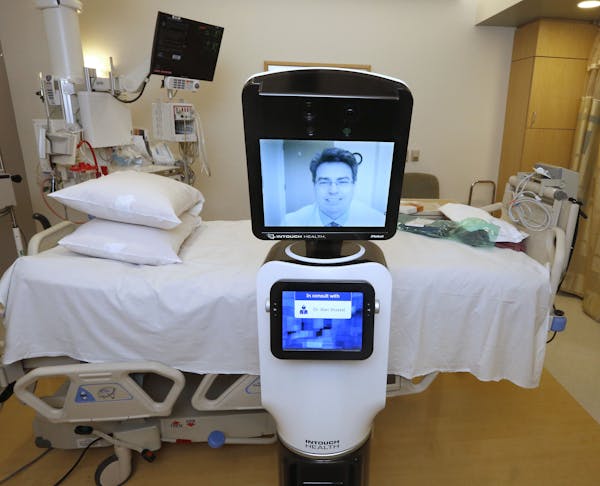Less than 24 hours after Karen and Michael Hidde returned home from the hospital with their newborn, the baby went quiet. Karen could not wake him. Following the advice of a nurse, the new mother ran a cold bath and held Colton, her only child, in the bracing water.
The baby did not move. His body remained limp, eyes closed.
The Hiddes rushed Colton back to New London Family Medical Center. There, staff began drawing blood from Colton's foot for testing. But as the new parents watched, foamy blood began pouring from their baby's nose and mouth. "They tried finding an airway and they were having problems getting the tube down," Michael Hidde said. "There was too much blood."
Over the next 12 hours, Colton would be rushed by rescue helicopter to a hospital in Neenah, then by a second emergency flight to Children's Hospital of Wisconsin in Wauwatosa. He would arrive at Children's so close to death that two doctors would struggle to decide whether anything could be done to save him. It was a crisis that never should have happened.
Wisconsin screens virtually all newborn babies for 44 rare and treatable disorders. One is the metabolic disease that had brought Colton to the brink of death. Had the New London hospital followed Wisconsin guidelines and forwarded Colton's blood sample to the state lab within 24 hours of taking it, doctors could have treated the baby's illness before it became critical.
'Hospitals should never, ever batch samples'
Colton could have been put on a special diet and sugar water, then gone home after an extra day or two in the hospital, said one of his doctors, David Dimmock, an expert in metabolic diseases at Children's and the Medical College of Wisconsin. The case raises questions about a landmark public health program used across the nation and trusted by millions of parents like the Hiddes.
Developed 50 years ago, newborn screening was designed to save babies from death or irreversible harm by detecting rare diseases quickly. The tests have changed infant health, saving or improving the lives of 12,000 babies a year, said a 2013 report by the Association of Public Health Laboratories.
But a Milwaukee Journal Sentinel investigation found that delays at some hospitals undermine the effectiveness of the tests and put babies at risk. Records show Colton's test was not received at the state lab 115 miles away until five days after it was taken. Doctors say that sometimes screenings are delayed because a hospital waits until it has a group of tests to send together — a discouraged but unregulated practice known as "batching." Colton's test appears to have been delayed by this practice, said a genetics counselor at Children's who called the New London hospital to find out what had happened.
Members of a committee that advises Wisconsin's newborn screening program acknowledged that some hospitals batch even though the state pays for a courier to shuttle blood samples to its lab. Hospitals get away with it because no laws require them to follow the guidelines. "Hospitals should never, ever batch samples," said Ada Hamosh, clinical director of the Institute of Genetic Medicine at Johns Hopkins University School of Medicine. "Samples should be sent out at least daily."
'I don't know what to predict for the future'
The Hiddes are a working couple from New London. Karen, 32, manages a Burger King; Michael, 23, is a machine operator for a lumber mill. On Tuesday evening, Oct. 2, 2012, Karen delivered by Caesarean section. Colton weighed 8 pounds, 11 ounces.
At 32 hours of age, within the recommended time frame, Colton had a blood sample taken from the heel, his newborn screening test. Once the sample had been preserved on filter paper, the clock began ticking. According to the Wisconsin guidelines, Colton's blood was to be sent to the state lab in Madison within 24 hours. Often overlooked, the tests have changed the face of certain diseases. Phenylketonuria, better known as PKU, was a disease that often left patients profoundly disabled. Today PKU is caught early enough to allow most patients to experience a normal mental development and life span.
One reason parents like the Hiddes know little about the screening is that each condition is rare individually — one in 10,000 births, one in 300,000, as few as a handful of cases around the world. Collectively, though, one out of every 800 newborns has a potentially severe or lethal condition that can be detected through screening and treated, a government estimate said.
In Colton's case, he was born with argininosuccinic aciduria, which occurs in one in 70,000 babies. The disorder was among those Colton had been tested for on his newborn screening.
It meant that his ammonia levels were off the charts. At high enough levels the ammonia begins killing brain cells, leading to permanent damage, coma and even death.
Colton needed dialysis and needed it fast. But performing dialysis on a newborn is risky. It could be done at two hospitals.
David Dimmock, on call for Children's Hospital that night, was at home in bed when the phone rang. The voice on the other end described a baby with an alarmingly high ammonia level, so high that it was not clear he could be saved. "The real dilemma we had at this point," he said, "was: Do we even transport the child down?"
Dimmock told the team to bring the baby.
Colton turned 1 in October. No one knows the extent of his brain damage. It may take years to determine how delayed he is in reaching key developmental milestones. "I don't know what to predict for the future," Dimmock said, "because he's exceeded all expectations."

This retired journalist changed professional wrestling from Mankato

All-Metro Sports Awards: Here are the 2023 winners

